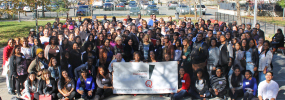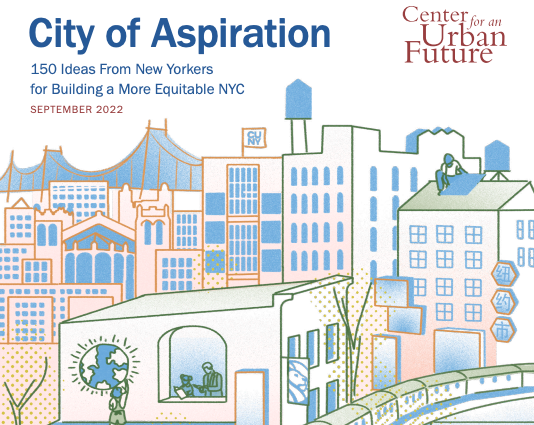Apoyo Queens Community House

Queens Community House brinda a las personas y las familias las herramientas para enriquecer sus vidas y construir comunidades saludables e inclusivas.

Center for an Urban Future: City of Aspiration - 150 Ideas From New Yorkers for Building a More Equitable NYC | September 2022: A WALK THROUGH NEARLY ANY NEIGHBORHOOD ACROSS THE FIVE BOROUGHS REVEALS A CITY ON the rebound. New Yorkers are dining outdoors on dan dan noodles, jerk chicken, and arepas; flocking to museums, theaters, and nightclubs; launching new businesses; and exploring every inch of the city’s public parks.
However, amid these welcome signs of recovery, more than two years of turmoil unleashed by the COVID-19 pandemic has only exacerbated deep inequities. New Yorkers of color remain alarmingly underrepresented in most of the city’s well-paying industries, leaving many stuck in low-wage jobs with little opportunity to reach the middle class. Tens of thousands of minority- and immigrant-owned businesses have been hit especially hard since 2020, exacerbating financial vulnerabilities that predated the pandemic. Caregivers have been stretched to their limits and beyond; mental health has emerged as a major public health crisis; and the unequal impact of climate change has grown increasingly severe. The pandemic also exposed longstanding disparities in access to housing, healthcare, education, transportation, and critical infrastructure—from high-speed Internet to parks and open space.
Fortunately, there is widespread consensus among policymakers that bold action is required to make progress toward a more equitable city and lay the foundation for a stronger and broader middle class. However, there is much less agreement over what specific actions should be taken.
This report aims to fill the void. It includes 150 concrete policy ideas for what Mayor Adams, the City Council, and other city leaders can do to create a more equitable city.
To generate fresh and achievable ideas, we turned to 150 exceptional New Yorkers and national policy experts, including community advocates, entrepreneurs, labor leaders, educators, economists, urban planners, artists, designers, public health experts, faith leaders, and more. We asked each of them to contribute a single policy idea that would expand economic opportunity for all, strengthen social infrastructure in communities across the five boroughs, and build a more equitable city.
This report contains ideas both practical and visionary, from providing free online tutoring for low-income students and removing degree requirements for many city government jobs to helping more inventors of color apply for patents, training front-line social workers to become legal advocates, assigning an architect to every community board, and even creating community choirs across the city to spark joy through the power of song. Individually, each of these 150 ideas has the potential to contribute to a more equitable city. Together, they provide a comprehensive blueprint for a renewed city of aspiration, where all New Yorkers can thrive.
...
86. Build data bridges so that government agencies and human services organizations can more efficiently share data Ben Thomases, Executive Director, Queens Community House
It’s never been more important to make New York City’s social services ecosystem more efficient. Indeed, city resources for human services have failed to keep pace with the skyrocketing number of New Yorkers in need of supportive housing, mental health screenings, food assistance, digital literacy training, and more. Yet the organizations providing these critical services are forced to use their precious staff time manually entering information into redundant databases. Queens Community House, for example, tracks participant data using its own Salesforce based database and separately enters data into DFTA or DYCD’s databases. To dramatically increase efficiency, the city should build data bridges, or API bridges, to make it easy and cost effective for providers to import and export data into and out of city systems. Rather than building one central data system that would cost billions of dollars, take years to implement, and inevitably fail to meet the needs of hundreds of different organizations, data bridges would allow providers to maintain their own systems based on their unique missions and needs. Implemented right, data bridges would enable communication between these systems, freeing nonprofit staff to focus their time on delivering high-quality services and saving millions of dollars.
Click here for the full publication.